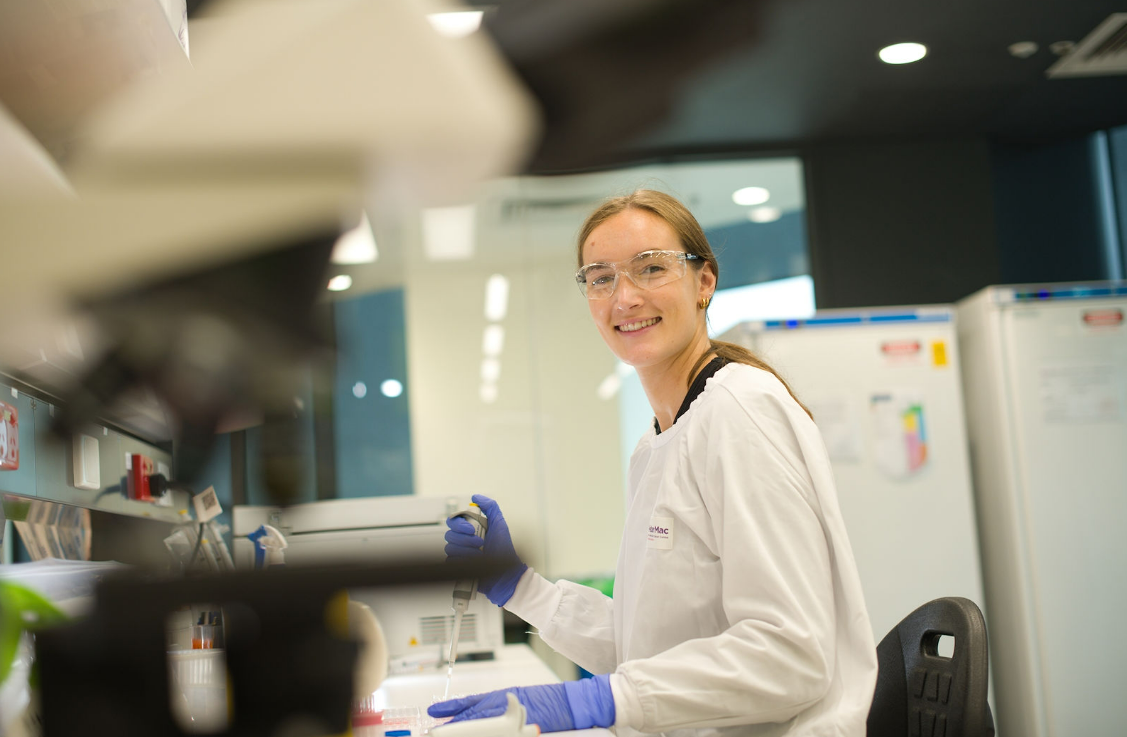Welcome to Peter MacCallum Cancer Foundation
Together, we can find new and better ways to prevent, detect and treat cancers
Peter MacCallum Cancer Centre is internationally recognised for helping to lead the search for cancer cures, and is Australia's only public hospital solely dedicated to caring for people affected by cancer. We support this vital work by funding new research opportunities, and providing researchers with access to the specialised resources they need to discover cures for cancer.
With your support, we can change the future of cancer research
Latest news
Carousel content with 6 slides.

The impact of a gift in your Will

Get creative for cancer research - 2025 Greeting Card Competition

Leanne’s story: Diagnosed with a rare head and neck cancer

Meet a researcher: Professor Kaylene Simpson

Larapinta Trek: a journey to make a difference

The Gamma Knife treats its 1000th patient at Peter Mac

UNITE TO FIGHT CANCER 2025
What does it take to find cures for cancer? Brilliant minds. Bold ideas. And a community that refuses to give up.
UNITE with hundreds of walkers and riders for a life-saving 10-day challenge from 16-25 October.
You can choose to walk, run or ride over 10 life-changing days. Every step, every kilometre, every dollar you raise will help accelerate cutting-edge cancer research at Australia’s only public hospital solely dedicated to cancer research and care.
Over the last seven years, thousands of passionate people like you have raised millions to advance research that brings real hope to people living with cancer and their loved ones. Now it’s your turn to UNITE, take on the challenge and help power research that saves lives.

“Every dollar you raise has a real, tangible impact. It brings powerful technologies into the hands of researchers, helps turn bold ideas into action, and directly accelerates progress toward better cancer treatments.
Your support makes a massive difference, and we couldn’t do our work without you.”
Tim Semple
Head of the Molecular Genomics Core (MGC) Facility at Peter MacCallum Cancer Centre
“I love the walk. It’s a time when we come together to reflect on life, spend quality time with each other and pound the pavement in the name of cancer. It’s a really special time of year for me.
Having seen first-hand how even the smallest of donations has made an impact and helped fund research is inspiring.”
- Anita, Unite to Fight Participant
Want to earn exclusive Unite to Fight Cancer rewards as you take on your chosen challenge?
Push yourself and you'll be rewarded when you hit fundraising milestones. Show the world how passionate you are about powering life-saving cancer research.
Plus you can give yourself an adrenaline boost as you light up mini-challenge badges on your personal fundraising page.

Want to learn more? Check out our most common FAQs below, otherwise get in touch: info@unitetofightcancer.org

We're delighted to announce that 26 new and novel cancer research projects at Peter Mac have been awarded Foundation Grants of up to $55,000 each, thanks to the generosity of our wonderful donors.

Each year the Peter MacCallum Cancer Foundation allocates philanthropic funds to promising new initiatives through the Foundation Grants program. This year, a total of $1.348 million will provide seed funding for 26 cancer research projects, currently in the early stages of development.
Selected through rigorous peer review, and assessed for scientific merit and compatibility with Peter Mac’s Strategic Directions, the winning projects are amongst the boldest and most innovative research proposals, each with the potential to enable major advances in our understanding of how best to fight cancer.
The Foundation Grants program is made possible by members of the Foundation's Endowment Fund – a small but powerful group of donors with the vision to help us rapidly accelerate the pace of discovery in cancer. Together, they have enabled Peter Mac to kickstart over 260 new research projects in the last 20 years.
Congratulations to 2023's Foundation Grant recipients:
Suad Abdirahman
Understanding therapy resistance in mucinous ovarian cancer
Shaza Abo
Measuring muscle mass using point of care ultrasound with embedded artificial intelligence in patients following bone marrow transplant: a nested exploratory study within a randomised control trial
Yuchen Bai
Promoting cell proliferation to block the invasion of head and neck cancer cells
Jesse Balic
Towards identifying therapeutic targets of graft-versus-host disease
Paul Beavis
Combining mRNA vaccines with CAR T cells for the effective treatment of solid tumours
Stephanie Best
Guiding the adaptation and fidelity of clinical innovations for scaling up across cancer care services: the Fidelity and Adaptation for Cancer Treatment when Scaling up “FACTS” tool
Sarat Chander
A Prospective Single-Arm Study of Partially Ablative Body Radiotherapy (PABR) for the Palliation of Bulky Tumours
Dane Cheasley
The diagnostic prospects of urine exosomes for women with low-grade serous ovarian carcinoma
Elizabeth Crone
Missed Nursing Care: Generating real world data to enhance quality and safety of care
Jennifer Devlin
Redeveloping a high-throughput RNA transcript screen for regulators of CDK-dependent transcription in cancer
Qian Dong
Targeting the blood-brain barrier transporters in brain cancer
Allison Drosdowsky
Development of a Health Services Research Impact Assessment Tool
Laura Forrest
Assessing the acceptability of a breast and ovarian cancer precision prevention intervention to stakeholders including general practitioners, genetic counsellors, and young women
Nicholas Hardcastle
Artificial intelligence driven anatomical modelling to enable longitudinal analysis in cancer imaging
Susan Harden
SABR One Stop Service for Lung Cancer
Safeera Hussainy
Let’s talk about sex: Co-designing a sexuality clinic at Peter Mac
Kun-Hui Lu
Enhancing B Cell Memory and Vaccination Efficacy by Repurposing CDK4/6 Inhibitors
Jovana Maksimovic
Evaluating new technology to improve single-cell analysis of leukaemia
Julia Milne
Establishing a genetically editable organoid system to model oesophageal tumourigenesis
Vanessa Panettieri
Next-generation radiation therapy treatment planning with artificial intelligence
Kathleen Irene Pishas
Interrogating the cell surface proteome to identify new therapeutic options for BRCA reverted High Grade Serous Ovarian Carcinomas
Gemma Reynolds
ACCELERATE - vACCination for hAEmatology patiEnts tReated with cellulAr therapies
Teresa Sadras
Towards preventing CD19 negative relapse by forcing antigen dependency
Janith Seneviratne
Discovering novel therapies that target non-small cell lung cancer lineage plasticity
Alison Trainer & Stephen Luen
Bringing patient-centred informed consent for tumour genomic profiling into the 21st century.
Leon Worth
Surveillance of Immune-Related Colitis using Artificial intelligence (SIRCA)








